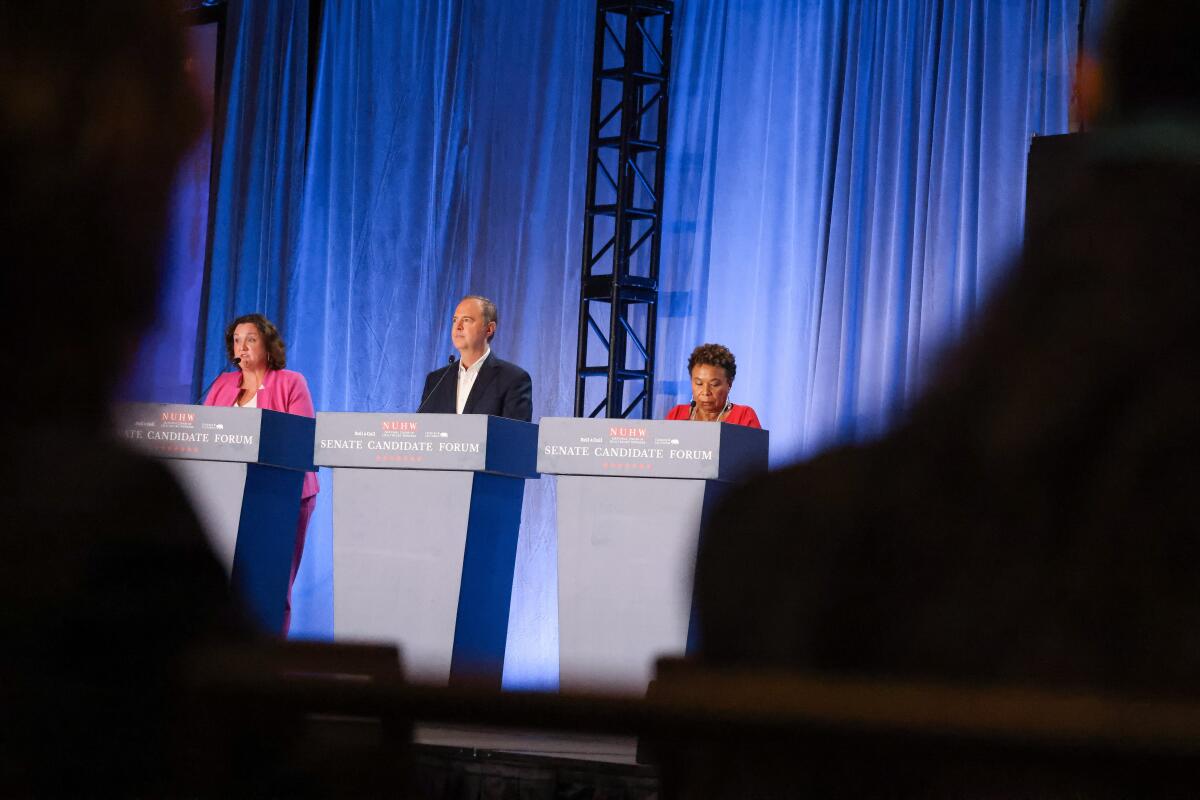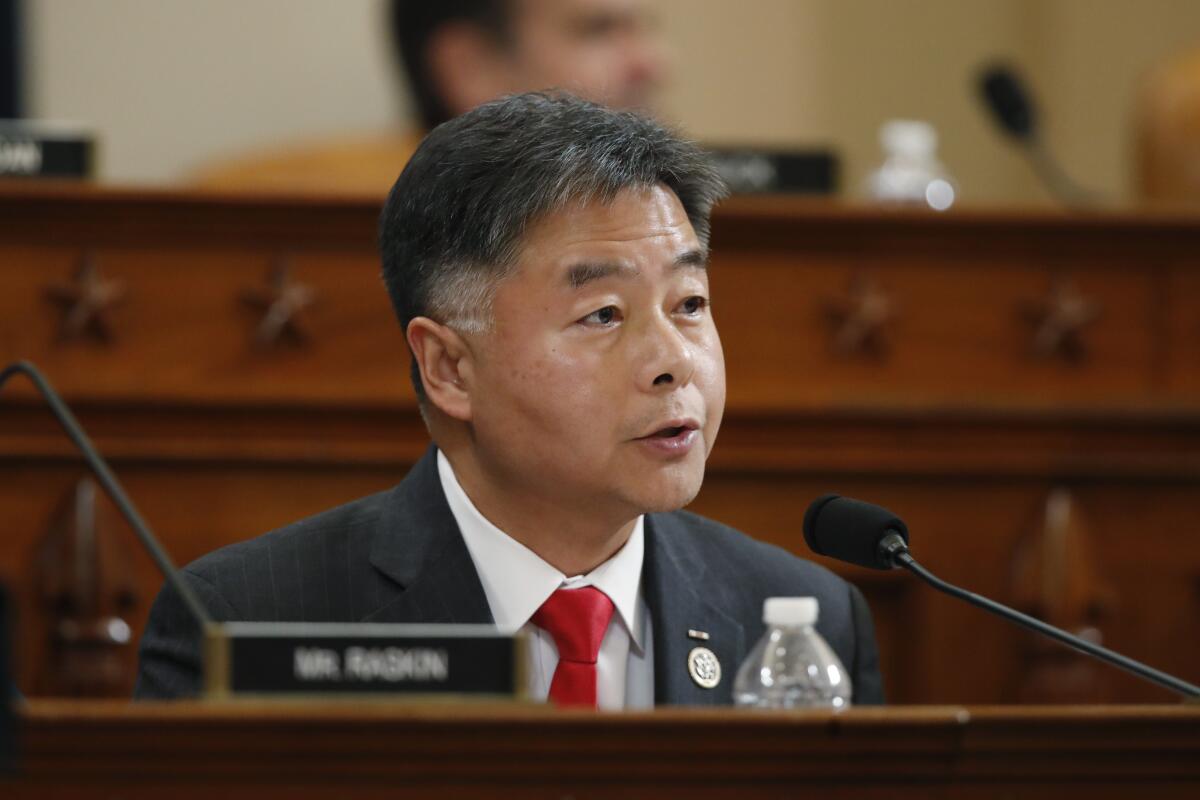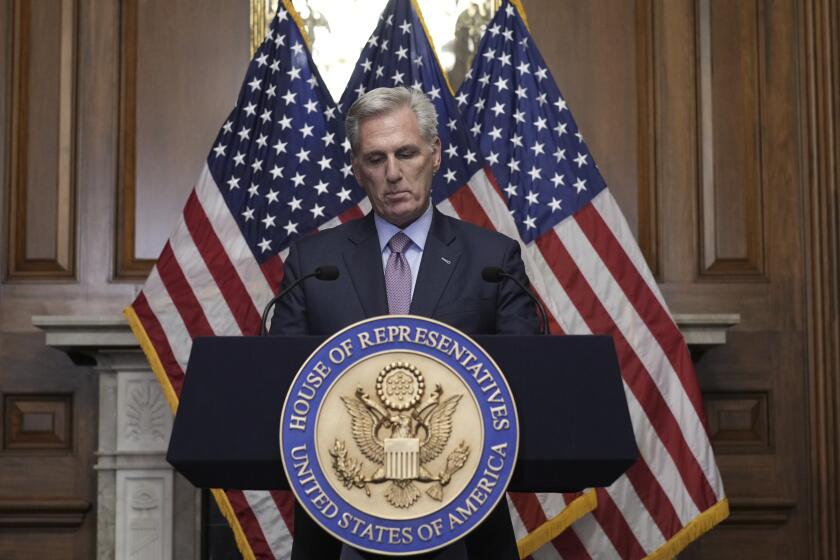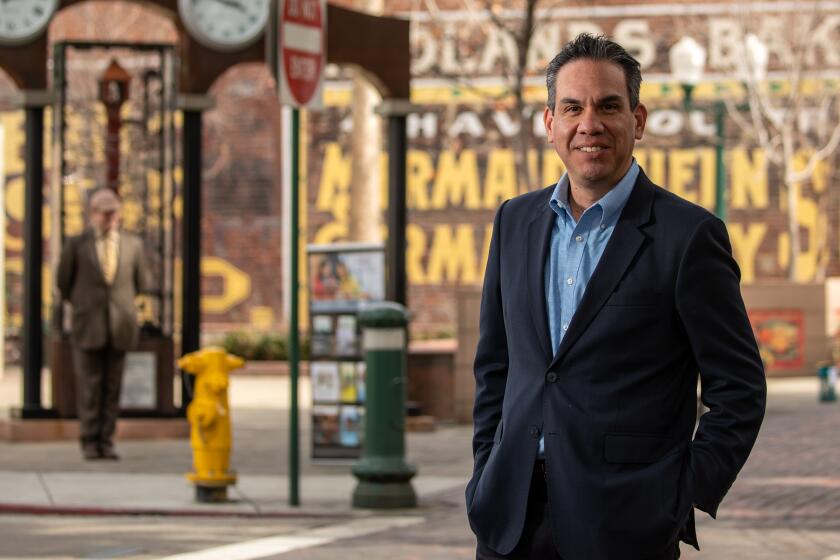California is losing clout in the U.S. Capitol

- Share via
For nearly five years, California reigned supreme in the U.S. House of Representatives, with the speaker’s gavel passing uninterrupted across party lines from Rep. Nancy Pelosi (D-San Francisco) to Rep. Kevin McCarthy (R-Bakersfield).
The nation’s most populous state enjoyed years of strength in Washington, where long-serving Californians held plum committee assignments, wielded vast influence and dispensed sage advice to less-experienced lawmakers. But a slew of House retirements in recent years and the death of Sen. Dianne Feinstein have chipped away at California’s Capitol Hill clout.
Amid a wider exodus from a Republican-controlled House paralyzed by partisanship, seven of California’s 52 members of Congress announced they would give up their seats. Senior or high-profile members including McCarthy, Reps. Grace Napolitano (D-Norwalk), Adam B. Schiff (D-Burbank), Anna Eshoo (D-Menlo Park), Barbara Lee (D-Oakland) and Katie Porter (D-Irvine) all plan to leave the House.
Porter, Lee and Schiff are running for Feinstein’s Senate seat, making it all but certain that at least one of them will remain in Congress next cycle, albeit in the upper chamber.
Why do a soul-crushing job with a 3,000-mile commute when you could do something else? Californians who’ve left Congress say they don’t miss it at all.
Two other prominent members of the L.A.-area congressional delegation, Karen Bass and Lucille Roybal-Allard, left the lower chamber just two years ago, and Bass now serves as L.A. mayor.
In the upper chamber, where Feinstein was the most senior Democrat, Alex Padilla, California’s now-senior senator, has served for less than three years. California’s junior senator, Laphonza Butler, who had never held elected office, was installed by Gov. Gavin Newsom less than three months ago and will be replaced after next year’s election.
Just two Californians remain in congressional leadership positions: Reps. Pete Aguilar of Redlands, chair of the Democratic Caucus; and Ted Lieu of Torrance, the Democrats’ vice chair.
A decade ago, Pete Aguilar was mayor of Redlands. How did he become the highest-ranking Latino serving in Congress?
In the House — an institution whose two-year terms ensure constant turnover — seniority matters. Veteran members of Congress are more likely to have influence within their own party and across the aisle, expertise on the most critical issues facing the nation and the savvy to shepherd legislation. Those years of experience can secure tangible benefits for constituents. Veteran representatives can land more federal assistance for their states and better leverage their power on pressing issues.
California has the same wants and needs as other states, such as transportation, education and Medicaid funding, as well as programs to address its recurrent calamities: drought, wildfire, flooding, earthquakes.
As a giant in the agriculture and defense industries and home to Hollywood and Silicon Valley, the state has also long depended on its clout to help shape vital tax and trade policies.
California’s loss of seniority, experience and control of the speaker’s gavel will reduce the state’s power in Washington, at least in the short term, experts say.
“Knowledge is power,” said Capitol Advisors Group President Kevin Gordon, an education lobbyist who closely follows the state’s presence in Congress. “And when we lose a number of the members of the delegation who have had that continuity and that experience of being in the majority and running committees and all the policy expertise that’s built up, you start all over again.”

Such a cycle is the “charm of our democracy,” Gordon said. But the near-term consequences are real, including “a brain drain on both the competence of the committees they serve on and the potential rewards that California gets by having people who know how to work the system.”
This year’s exodus of lawmakers is hardly unique to California: More than 35 members of Congress announced plans to leave their offices after this term, according to Ballotpedia. The Not-Running-Again Caucus represents a rare bipartisan wave on Capitol Hill, with both Democrats and Republicans heading for the exits this year in substantial numbers. They’ve cited a variety of reasons, including toxic dysfunction, the personal sacrifices and constant travel synonymous with the job and a desire to pursue other offices. Some Republicans have also expressed frustration with the current state of their party.
The Los Angeles-area House delegation is losing three members this year, with Rep. Tony Cárdenas (D-Pacoima) announcing his departure alongside Schiff and Napolitano. Among the three, Cárdenas is the newcomer, having served only a decade. Napolitano has been in Congress since Bill Clinton was president, and Schiff arrived in Washington months before the Sept. 11 terrorist attacks.
The kind of institutional knowledge and cohesion that long-serving members of the Los Angeles-area delegation have is important, but who controls the House is what really matters, Bass said.

The mayor, a former six-term member of Congress, cited the example of Schiff, “who has all the seniority in the world” but was censured by the Republican-controlled House this year and kicked off the powerful House Permanent Select Committee on Intelligence in January, along with fellow Californian Rep. Eric Swalwell (D-Dublin).
The size of the L.A. delegation and its remaining members’ seniority will help minimize the impact of retirements on the region, said Fernando Guerra, director for the Center for the Study of Los Angeles at Loyola Marymount University.
The sheer size of the Los Angeles delegation — at least 17 districts include some portion of L.A. County — means that the area can lose multiple senior members and still have several veterans remaining in the delegation, Guerra said, citing the continued presence of people like Lieu and Rep. Maxine Waters (D-Los Angeles). Some metropolitan areas, he noted, might have only one or two representatives.
And rookie status is, by definition, only a temporary ailment.
Take Lieu, now a five-term lawmaker who serves on the influential House Judiciary Committee and as vice chair of the Democratic Caucus. Less than a decade ago, he was the newcomer, tasked with replacing Rep. Henry Waxman, a giant of the House who served for nearly four decades and was one of the nation’s most influential Democratic lawmakers.

The 20-term congressman’s departure led some Californians to worry about a depletion of the Golden State’s political might. But Pelosi would return to the speakership just four years later, with McCarthy following her in 2023.
In the Senate, Feinstein had long been unwell before her death in September and her colleagues and the news media had questioned her mental acuity in the years before her passing. But even as her health waned, Feinstein’s seniority in the upper chamber still provided formidable power for California.
“Senior members have usually built up powerful staffs that are used to taking care of things,” said U.S. Senate historian emeritus Donald Ritchie. “If a senator becomes ill, their office continues to function pretty much the same as before.”
Junior members of the Senate typically haven’t had the time to build up that kind of experienced staff, and they usually don’t have the same extensive committee staff, Ritchie said.
Still, even with Feinstein’s death and the slew of broader departures, Cárdenas did not seem worried about any ebb of California power in the Capitol. He praised the local and state legislative experience of his northeast San Fernando Valley political compatriot (and Washington roommate), Alex Padilla, saying that at just 50 years old, the senator would probably serve for decades to come.
“It’s not just about seniority, it’s about who the person is [and] what they’re bringing to the table,” Cárdenas said.
Times staff writers Erin B. Logan and Mark Z. Barabak contributed to this report.
More to Read
Sign up for Essential California
The most important California stories and recommendations in your inbox every morning.
You may occasionally receive promotional content from the Los Angeles Times.













